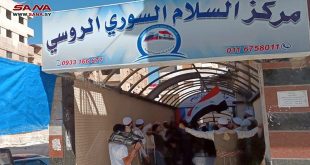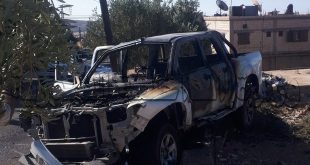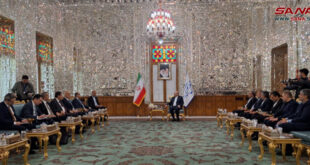Damascus, SANA- Upon directions of President Bashar al-Assad, Prime Minister, Imad Khamis, and the accompanying delegation, on Monday continued a tour in Damascus Countryside Province to inspect the service and developmental situations in al-Qalamoun area and to visit the cities and towns of al-Mrah, Qara, Deir Attiya, Yabroud and al-Nabek.
The tour aims at setting a comprehensive developmental economic and service vision for the area with its agricultural, industrial and architectural capabilities as it supplies Damascus and other provinces with a number of agricultural products and light and medium industries.
The delegation started its tour by visiting al-Mrah town and meeting the locals in it and listening to their demands.
Khamis clarified that the visit to al-Qalamoun area sends a message of amity to the locals there who have been an example to follow in loyalty and sacrifice, and after the great triumphs achieved by the Syrian armed forces which liberated the area of terrorism.
He affirmed that the government will shoulder its responsibilities in providing all the needs to enhance the resilience of the locals in al-Mrah town and to improve the service and developmental situation in the town.
The delegation visited the farms of the Damascene Rose in the town, affirming that all needs to improve the situation of the agricultural sector in it will be guaranteed, and calling for expanding the plantation of the rose to cover all the suitable areas.
Khamis gave instructions for establishing a unit for extracting the Damascene Rose oil in the town with a cost of SYP 400 million.
In a statement to journalists, Minister of Agriculture and Agrarian Reform Ahmed al-Qadiri underlined the importance of planting the Damascene Rose from the aesthetic and economic sides, affirming that the project of the unit is an important developmental project that would encourage the plantation of the rose.
For her part, Minister of Social Affairs and Labor Rima Qadiri asserted the importance of the productive and developmental projects, indicating that the Ministry of Social Affairs provides all the possible help to the locals along with the efforts exerted by the Agriculture Ministry.
Inspecting the work reality at the Gas Well 3 at Qara Gas Field, Khamis told journalists that there is a governmental program to rehabilitate energy sector which has been destroyed by terrorists.
In a relevant context, Minister of Petroleum and Mineral Resources, Ali Ghanem, announced the Well 3 will start production within three months, indicating that the area to the north of Damascus embraces a number of the promising gas fields.
The delegation also visited the Monastery of Saint Jacob in Qara Town which implements a number of developmental, social and relief projects, and members of the delegation were briefed on the work plan of the Monastery and the varied services which it provides.
“Our role today is to send Syria’s message of amity to the world and through you to the peoples of your countries…The Syrian people thank you for your love to their homeland,” Khamis said during a meeting with the Monastery staff and its visitors and tourists.
Khamis tasked a joint committee with visiting the area and meeting the needs of the peasants in it to resume their agricultural activity and to overcome the obstacles caused by the terrorist war.
The Premier also inaugurated a popular market in Qara that embraces the products of rural women.
In Deir Attiya, Khamis laid the cornerstone for starting the work at the Industrial Zone with a cost of SYP 1.5 billion.
Khamis met relatives of the martyrs and the injured at Deir Attiya City Council and listened to their demands, ordering to form offices for them at all administrative units to provide all required facilitations and services to them.
The delegation also inspected the stages accomplished at the project of Sewage Treatment Plant in Deir Attiya.
Minister of Water Resources, Nabil al-Hassan, said in a statement that his ministry estimated the damage caused to the plant due to the terrorist attacks, indicating the SYP 400 million had been allocated to the project as the total cost reached SYP 1.1 billion.
Minister al-Hassan expected that the plant will be put in service after “six months,” indicating that the plant was destroyed by terrorists and it has gone out of service since 2011.
The delegation inspected Yabroud Industrial area and was briefed on the challenges and obstacles hindering the production process and the proposals for reviving the area that was sabotaged by terrorism.
Khamis met a number of industrialists, businessmen and owners of investment projects in Yabroud and listened to their demands on developing the service and developmental situation in the area, in addition to launching projects that aim at supporting the national economy.
The direct meetings aim at tackling the challenges, imposed by the terrorist war on the Syrian people, and promoting the developmental and service situation in the areas which the Syrian Arab Army had restored security and stability to them, the Premier elaborated.
Khamis stressed that the private sector is considered an active main partner in the developmental process, emphasizing the government’s continuous support to all industrialists and owners of the projects which back the national economy.
Industry Minister, Ahmad al-Hamo, expressed the government’s keenness on protecting the national industry, as the government exerts serious efforts for combating the smuggling which harms the local industry.
Minister of Local Administration, Hussein Makhlouf, stressed importance of reconstructing the industrial area in Yabrous and developing its performance.
Finance Minister, Ma’moun Hamdan, said that the government gives top priority to supporting the production and industrial process, reiterating that Yabroud’s industry and agriculture will restore its remarkable position.
The delegation also met the popular figures and representatives of administrative units in al-Nabek city.
The prime Minister expressed the government’s readiness to offer all needed facilitations for re-operating all halted economic facilities.
He said that the local society is a main partner in the developmental process since it managed, by its national expertise, to overcome the difficulties imposed by the war and support the national economy in various ways.
R.Jazaeri/H.Zain/Ghossoun
 Syrian Arab News Agency S A N A
Syrian Arab News Agency S A N A




